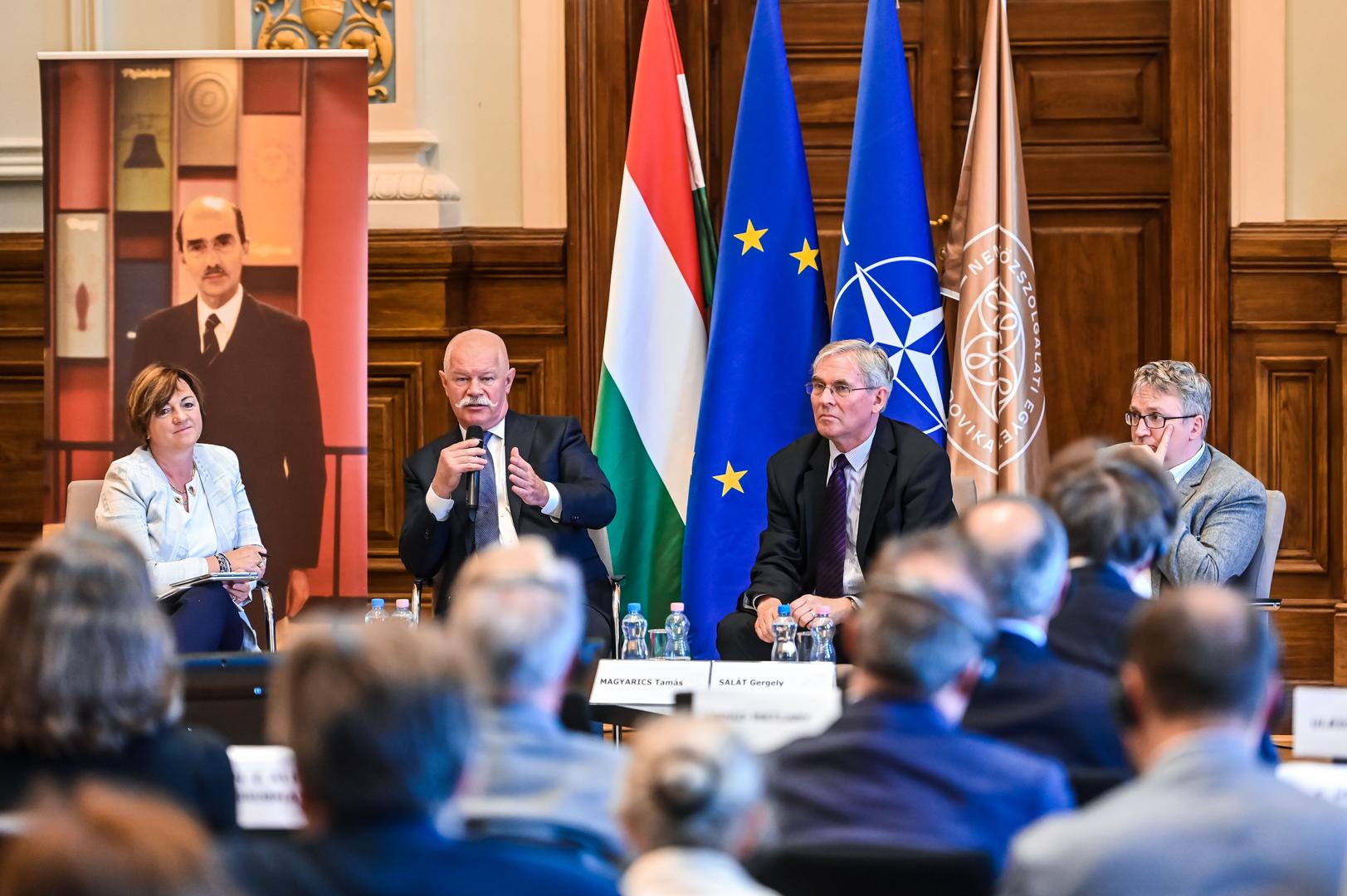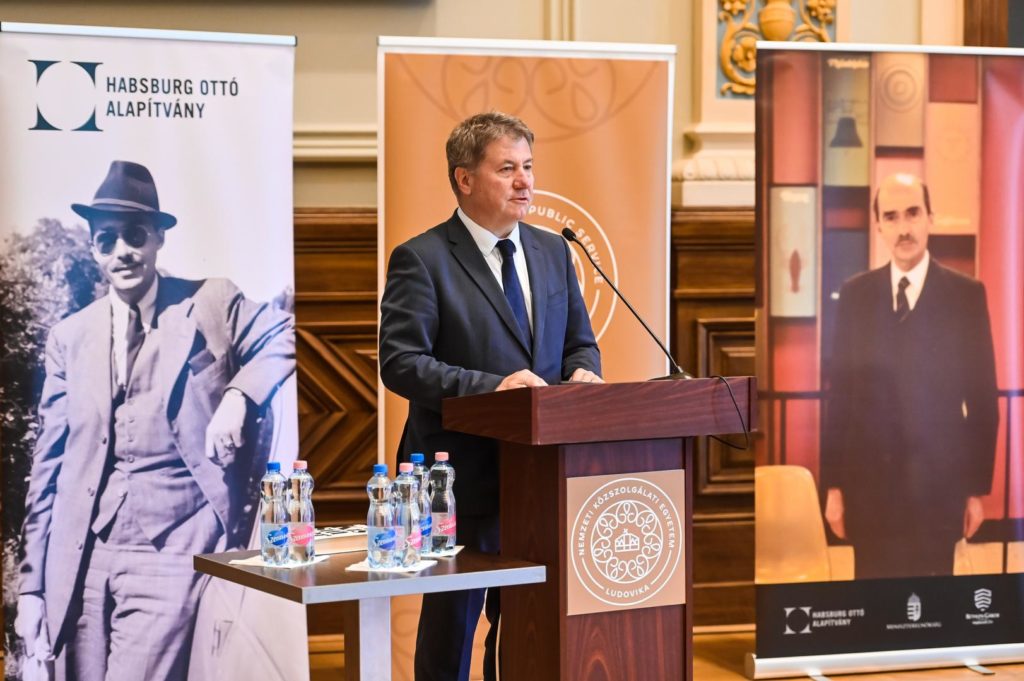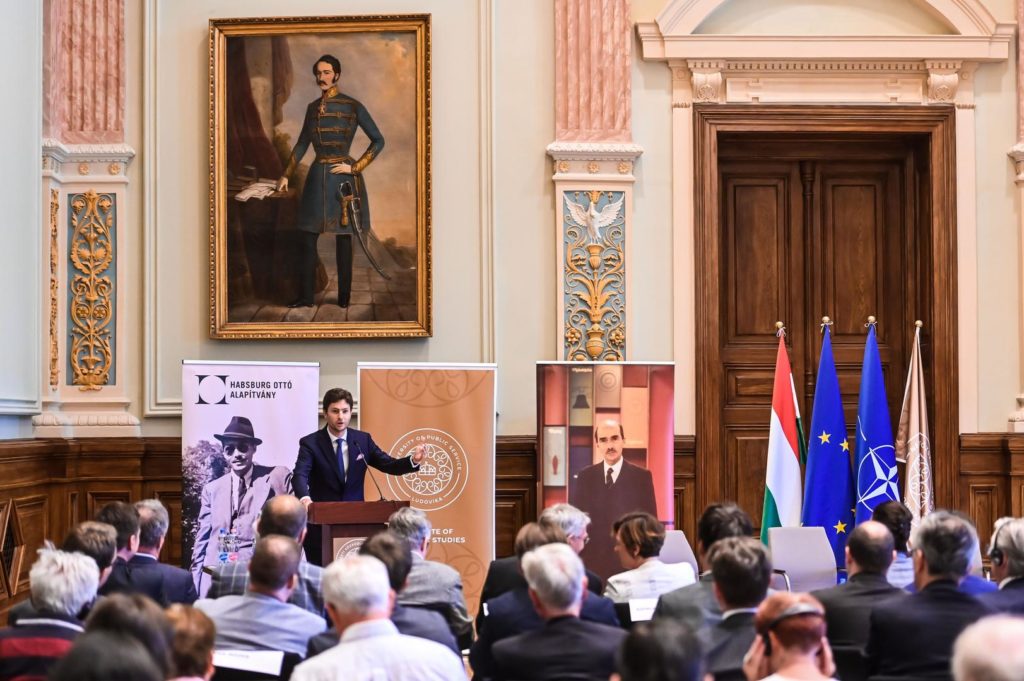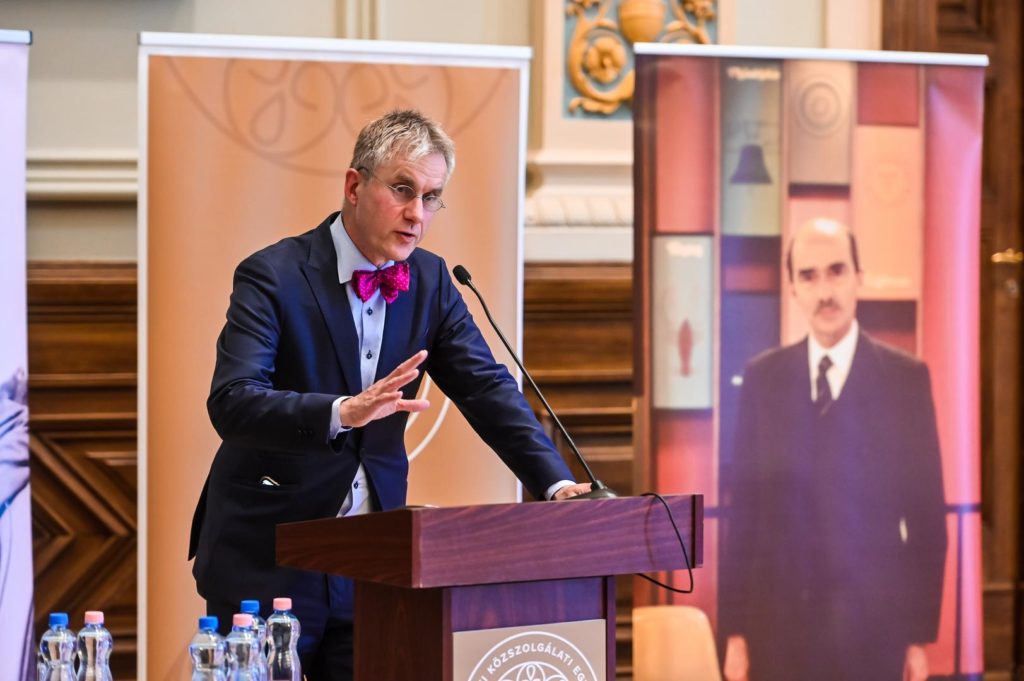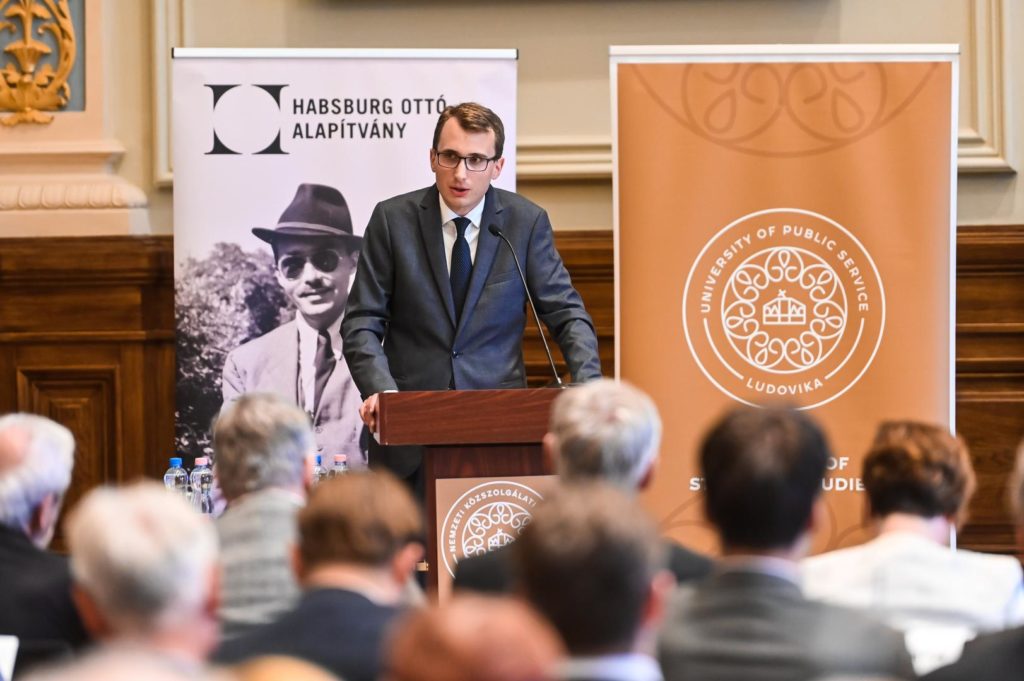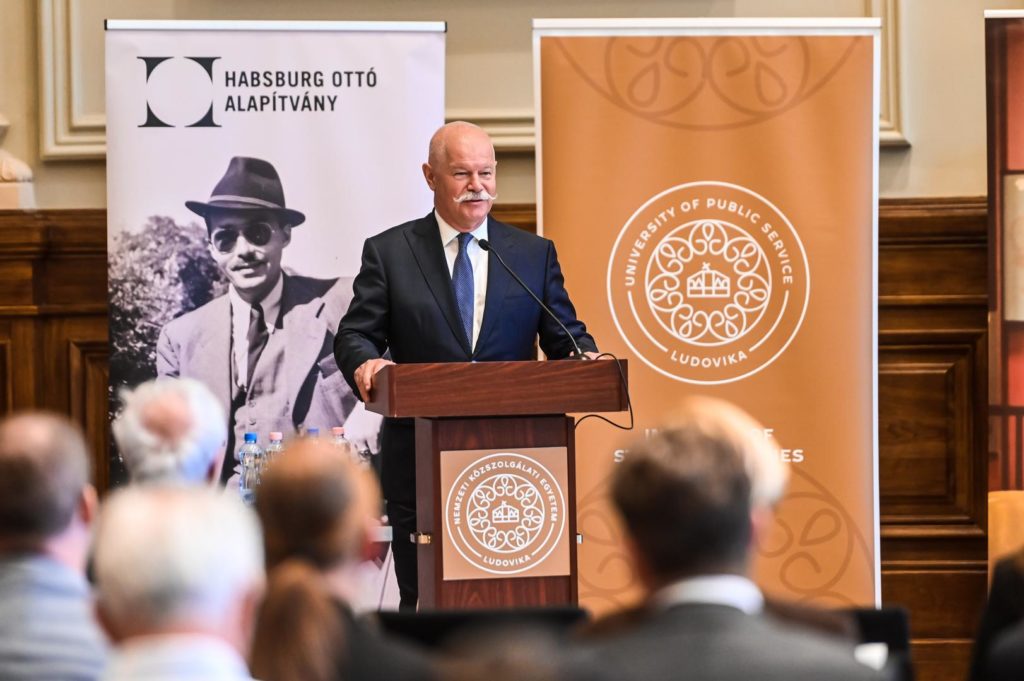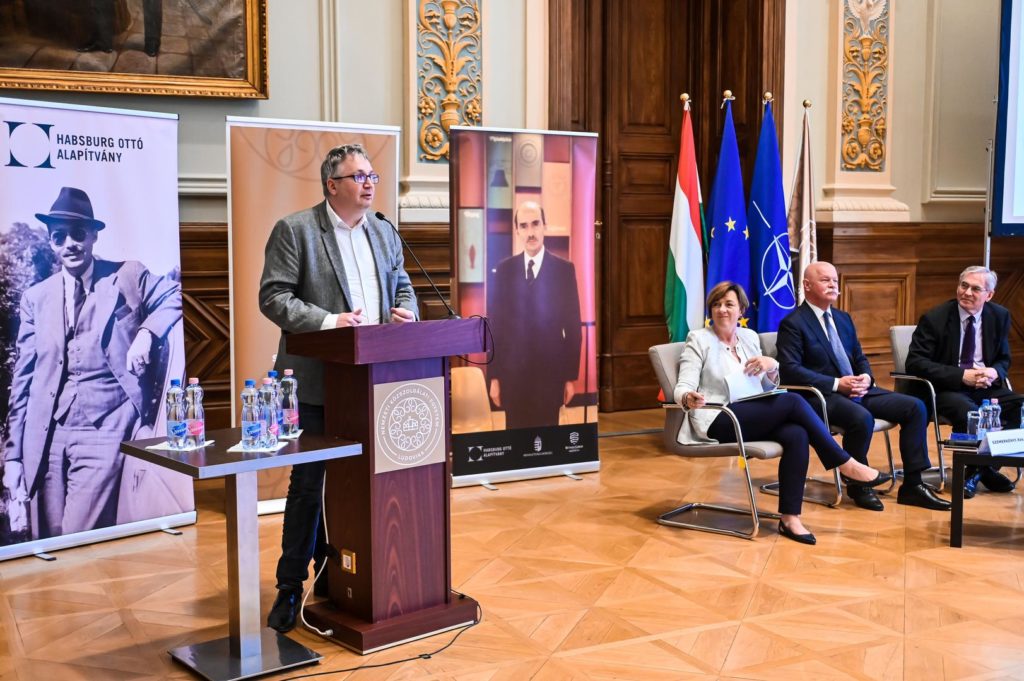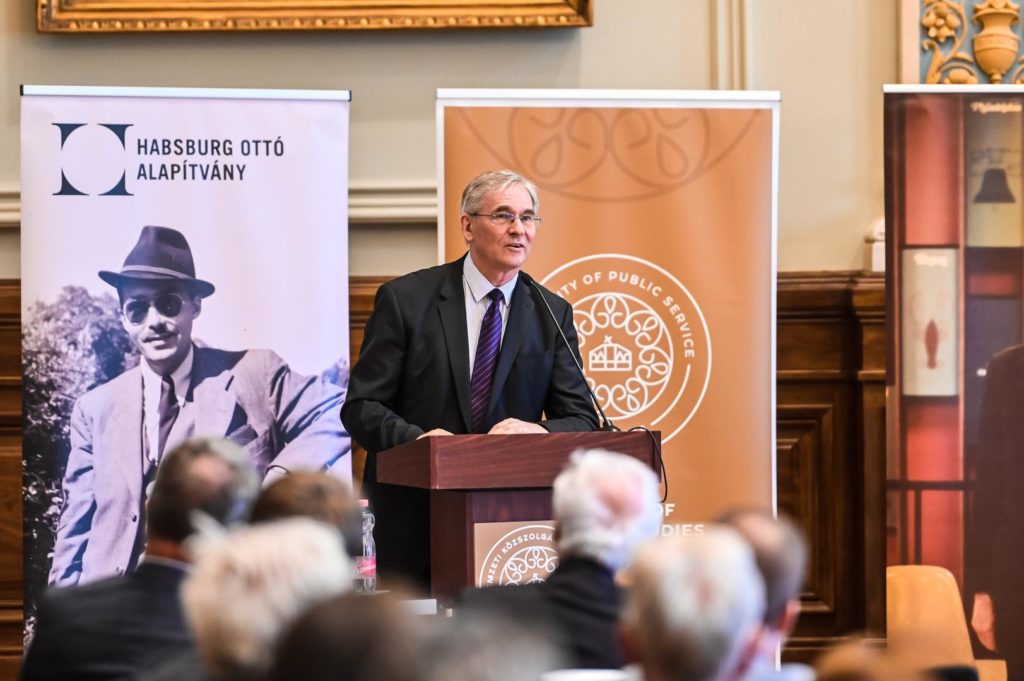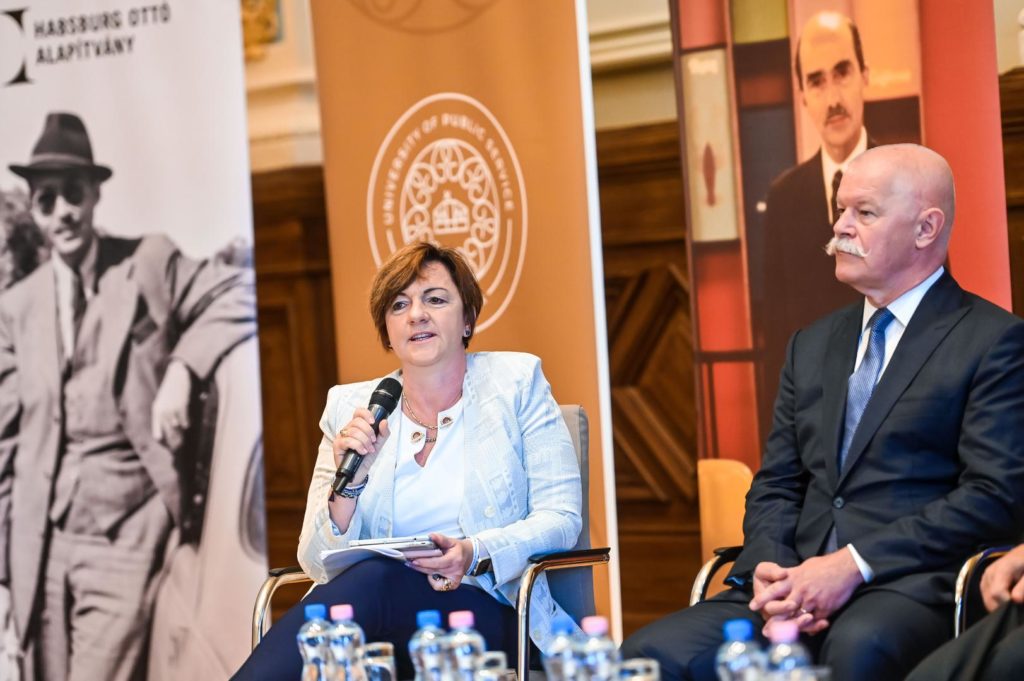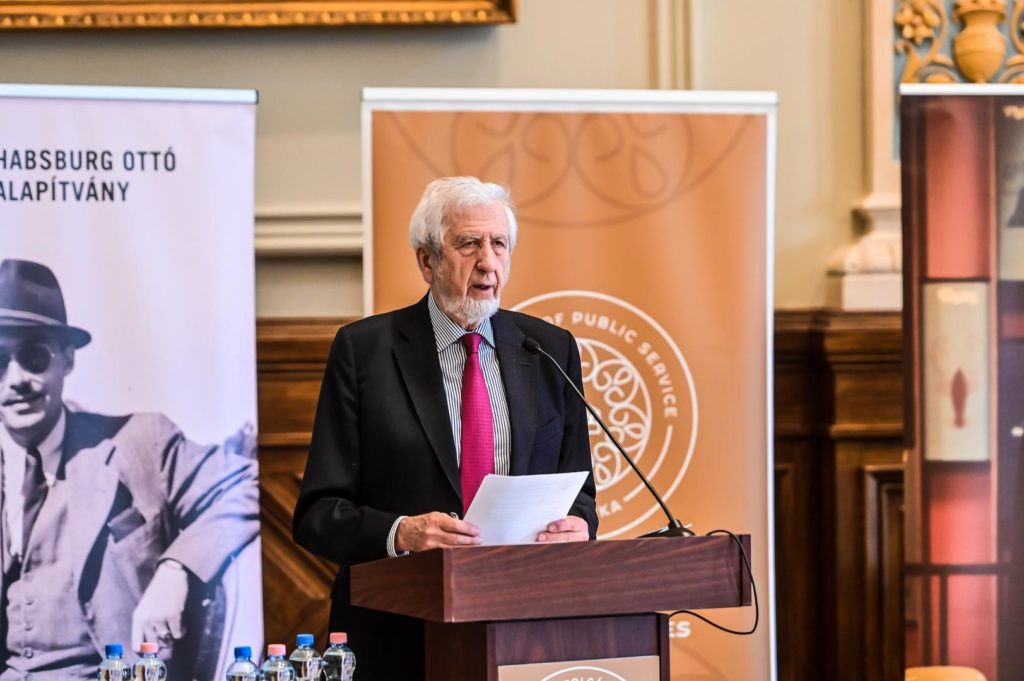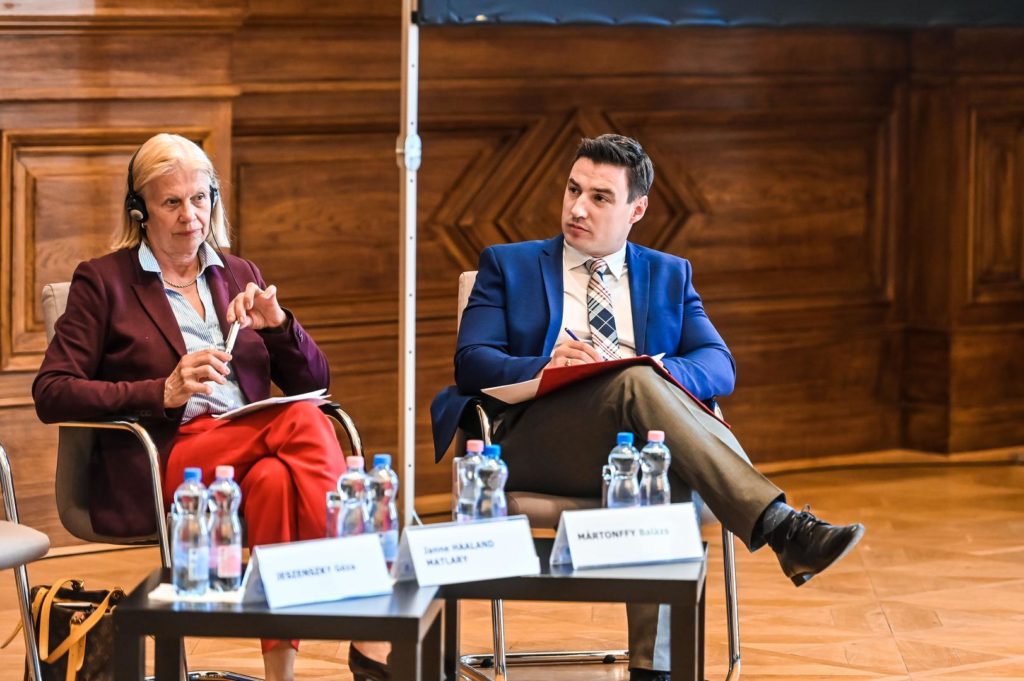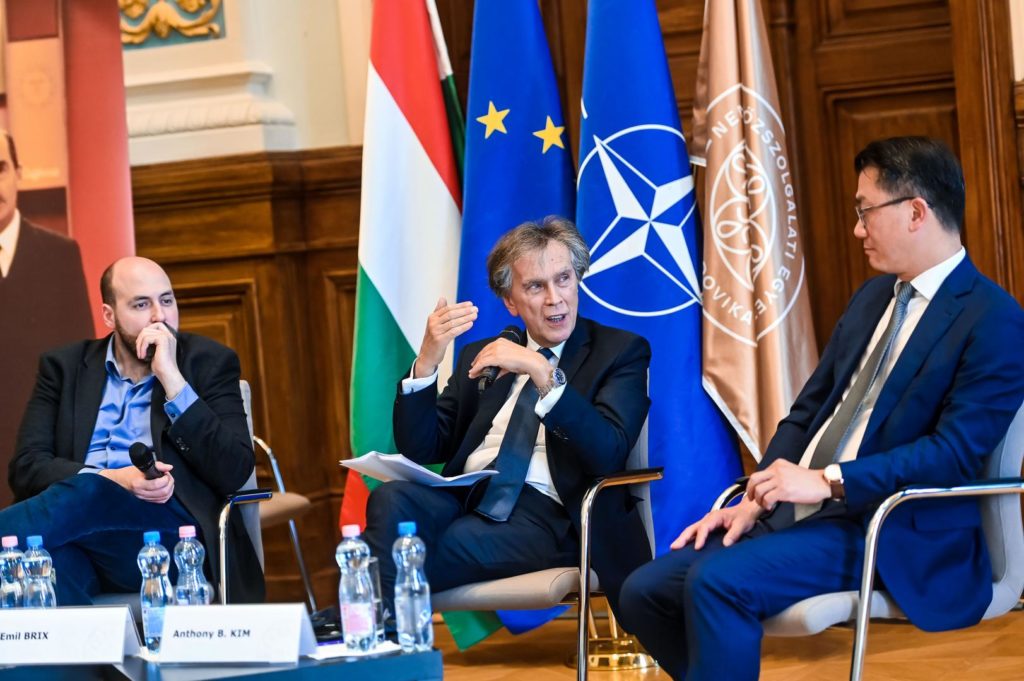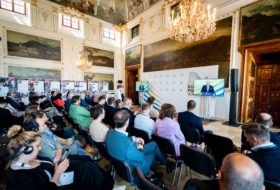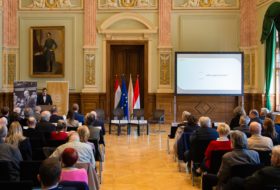On 26 May 2023 – one day before the 100th birthday of the former US Secretary of State – Gergely Prőhle welcomed the guests and audience who filled the Széchenyi Hall of the University of Public Service. The director of our Foundation recalled his encounters with the honouree, describing him as a European-literate, spirited intellectual with an outstanding knowledge of history, on whose ideas generations of politicians have grown up and whose assessment of the state of affairs is still heeded by the world to this day. Kissinger never denied the culture he was raised in. In 1973, sensing the dangers looming over transatlantic relations, he announced the “Year of Europe”, drawing attention to the importance of strengthening Europe’s unity without compromising its relationship with the United States.
Jérémie Gallon, Director at McLarty Associates’ European division and author of Henry Kissinger. L’Européen, published in 2021, focused his presentation on the insights provided by the life of the man. The collapse of the Weimar Republic was a cautionary tale of the vulnerability of democracy for Kissinger, who spent his childhood in Fürth, and after a few years, led the family to relocate from their homeland. Therefore, one of the cornerstones of his later political credo became the kind of strategic thinking that would protect the democratic government from this danger – or at least minimise it. He addressed this problem as early as the writing of his thesis (on the views of Spengler, Kant and Toynbee) and then in his doctoral dissertation, detailing the European great power concert that Metternich had established and guaranteed peace on the continent for a century. As a politician and analyst, he put his theoretical knowledge to practical use as an expert on US presidents for decades, serving the long-term interests of his chosen country. The challenge at the time was to avoid a nuclear confrontation. The most characteristic feature of Kissinger, Gallon saw, was that he was always able to remain two-faceted: his academic and political careers were mutually reinforcing, and he did not fall into the trap of specialisation but retained the ability to be reflective.
Ulrich Schlie, Professor at the Department of Security Policy and Strategic Research at the University of Bonn, called the former Foreign Minister a man of superlatives in his lecture (Henry Kissinger und Deutschland: 100 bewegte Jahre): no one has written a 4,000-page summary of his own tenure; he was the most intensively involved with Germany, and his work alone was recognised with the Nobel Prize (1973). Kissinger was well acquainted with the leading politicians of the post-war Federal Republic of Germany – he was captured in a photograph with Helmut Schmidt, Franz Joseph Strauss, and Ralf Dahrendforff, among others – but he was also passionately interested in the nation’s past: among the shapers of his historical vision, after Metternich, he planned to write a book on Bismarck, the father of 19th-century Realpolitik, but the monograph, at least as far as we know, is still incomplete. In conclusion, Schlie quoted Kissinger’s words for today, that prophets have caused more suffering than statesmen and that the leaders of the West, therefore, (would) need imagination, devotion and vision to avoid the worst that threatens our time.
Our colleague Bence Kocsev reviewed the relationship between the two key figures of the Cold War, Otto von Habsburg and Henry Kissinger, through a corpus of almost 200 letters held in our Foundation. It is not an exaggeration to claim, he suggested, that understanding the international political history of the 1970s and mapping and assessing the intellectual impact of the two is impossible without a thorough knowledge of their networking activities. Their career is also an example of how social capital can be converted into political capital and how homo politicus and homo intellectualis can be compatible – although this privilege is only granted to a very few.
János Csák was the first speaker of the panel on defining China’s geopolitical position in the 21st century. In his data-rich keynote address, the Minister for Culture and Innovation of Hungary said that to achieve understanding, the crucial factor is gaining insight into the Chinese self-image. He said that identity, self-determination and agency are the three most important factors that determine the country’s economic, military and cultural policies, and these explain the still-living tradition of collectivism and authoritarianism dating back thousands of years. The result is impressive: China has managed to lift 80% of its population out of extreme poverty in the last 40 years. What challenges this achievement – and the necessity to sustain it – raises at regional and global levels and how the great powers of world politics respond to this challenge is probably the most cardinal dilemma of the years ahead.
Gergely Salát, Head of the Department of Chinese Studies at the Pázmány Péter Catholic University, referring back to the occasion of the conference, praised Kissinger for having recognised the potential of China’s development as a great power in the early 1970s. The era of good relations with the United States ended with the Tiananmen Square massacre (1989). Since then, US foreign policy has been characterised by a frantic search for a modus operandi. At the end of that process – Gergely Salát referred to the overseas expert’s recently published book on China – the possibility of an armed conflict cannot be ruled out.
Tamás Magyarics contributed to the image of the Eastern Power with five statements worth considering. The former ambassador and expert on America reminded us that Chinese civilisation is unique – its values, worldview and institutions cannot be integrated into the Western world. He also warned against the danger of false historical analogies that would seek examples going back as far as antiquity to model the current situation. He emphasised that to regard today’s China as a communist state is a grave mistake, as Kissinger had already observed in more nuanced terms fifty years ago. It would be equally wrong, he said, for the US to revert to the Cold War logic against the Soviets – this “version 2.0” is the worst possible scenario (because it has unforeseeable consequences) that exists. Lastly, the professor echoed the words of the celebrated figure, who has always stressed the role of continuous interaction between the great powers as a means of conflict management. He noted that, regrettably, the last two presidents of the United States did not operate along these principles.
Géza Jeszenszky recalled the shared journey of Hungary and NATO after the regime change, in which he was an active participant as Foreign Minister of the Antall government, and at the turn of the millennium, as Ambassador to Washington. Referring to Kissinger, he said that the conclusion of the Russian-Ukrainian war would most likely result in Ukraine’s loss of territory with the forced cession of Crimea; however, it would be imperative if the disputed regions were settled by national self-determination (through a referendum?), in the framework of a comprehensive agreement on the protection of minorities.
Janne Haaland Matlary, Former Secretary of State in the Ministry of Foreign Affairs in the Norwegian government, has also taken a firm stance on the issue. The professor from the University of Oslo, accompanied by her Hungarian husband, considers the Russian side’s action a textbook example of aggression, violating all existing international legal formulas. Taking into account the impact of the conflict on the global power realignment, the speaker considers it extremely difficult to define what success would mean in the prevailing situation – not only for the belligerent parties but also for the European Union, the United States and China. She said that the eastward enlargement of NATO should also be reconsidered, adding that the right approach would be to “defend but withdraw”.
Putin’s revisionist intentions are nothing new; in fact, they can be traced back to the dissolution of the Soviet Union, though it was only in 2022 that the Russian leader felt that the combination of a favourable diplomatic constellation and the technical development of the military could lead to success. Emil Brix, director of the Vienna Diplomatic Academy, confessed that he failed to understand the Russian president’s aim in launching a war against the West, which he had mixed with ideology and falsification of history, following a well-tried recipe. The former Austrian ambassador to Moscow believes that the armed conflict is a ploy to replace a missing national identity. Putin refuses to give up his role as a great power as “the colossus of the East”, which has been a significant factor in the life of the continent since 1815 – in this, he follows Kissinger’s logic – and in the long term, he is working towards the creation of a multipolar world order.
The final speaker at the conference was a research fellow from The Heritage Foundation. Anthony B. Kim spoke about China’s growing influence in the world, which began to take off during Kissinger’s foreign policy paradigm shift and engagement with the US. In hindsight, he admitted, the overture fifty years ago was a mistake. Assessing the Russia-Ukraine conflict, he noted that it clearly marks the beginning of a new era; and, at the same time, it is welcome that the reaction to the threat has strengthened transatlantic ties, it cannot, if Kissinger’s principles are followed, be accompanied by a lasting quarantine of Russia (WTO, international organisations, economic sanctions). It may also have the positive effect of triggering a ‘reconfiguration’ of the aggressor over time.
Through the interaction of questions raised and answered by the experts in each panel discussion, the audience was able to be part of the celebration.
Photos by Dénes Szilágyi
